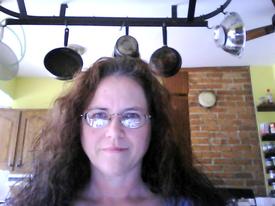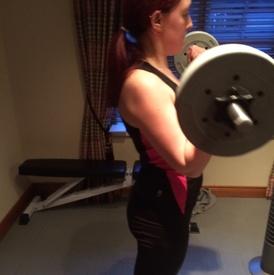10 Things You Need To Know About Weight Loss
Replies
-
Nice post!!0
-
very interesting! thanks for the info!0
-
Accurately recording calories is a must, which is why I despair when I see things like a chicken breast, 1 cup in the database, because you cannot accurately gauge the weight and therefore calorie content of solid food like chicken by volume.I watched this first time round and was fascinated by the mixture of common sense and cutting-edge science. The counting calories accurately point is absolutely the basis behind most people's weight gain and subsequent loss. So many people complain they don't eat much and blame slow metabolisms when in fact they down far more calories than they think. It was certainly my problem! Secret Eaters focusses on this exclusively, and often people consume more than twice what they record based on portion size, sneaky nibbles and unrecorded drinks.
Portion sizes vary. Only today I tried a new cereal from Aldi (basically their take on crunchy nut clusters) and the portion size on the box is 30g which when measured out was barely 3 spoonfuls - a regular cereal bowl actually contained 140g almost 5 times as much and at 141 Calories a portion that's a whopping 658 Calories a bowl!
And the misconception that certain foods are ok because they are good for us, which in the programme saw actress Debbie Chazen put away a kilo of fresh fruit salad every morning, not realising just how many calories it contained.0 -
Remember seeing this a while back, thanks for posting it.
As much as I hate counting calories and find it a really tedious thing to do it definatley works, otherwise I think I'm eating healthy and keep a 'mental check' of what I'm eating but bad habits with chocolate etc creep back in really quickly, ig I count them it just keeps me mindful of what I'm eating0 -
I watched this documentary a while back too. I found it really interesting!
Thanks for posting it! I'm definitely going to save this information!!!0 -
I love me a good, low-fat diary.0
-
Thanks for sharing!0
-
I love me a good, low-fat diary.
You wouldn't want to see my holiday diary then - full of fat!0 -
Saving for later,thanks0
-
Fat is always the macro I come up short on.I love me a good, low-fat diary.
You wouldn't want to see my holiday diary then - full of fat!
Sweet irony.0 -
Bumping to remind me of the next transmission date...getting Sky this week!0
-
This was a BBC programme first shown earlier this year and repeated on one of the Sky lifestyle channels this week. I missed it the first time, so I apologise if it has been discussed on this forum before, but I thought it was really interesting and I believe it may still be available to view on iPlayer for those in the UK.
The following is a synopsis of the programme which I have found on another forum:
1) Don't skip breakfast
I think this one is well known, but this showed a different reason. The man being studied had brain scans when presented with pictures of food in two different conditions.
The first condition was with a full breakfast, and when shown pictures of both low and high calorie food, the part of the brain controlling appetite (hypothalamus I think??) didn't produce much activity.
In the second condition, with no breakfast, the same part of the brain lit up much more when presented with high calorie foods, meaning that we subconsciously crave the high calorie foods, which could make up for the skipped breakfast or go over it in terms of calories.
2) Change to smaller plates (portions)
A study was done on two groups of people watching a movie. One group was presented with a large bucket of popcorn, and the other group with a smaller bucket of popcorn.
Both buckets were big enough so that the participants could eat their fill and still have a lot remaining; nobody finished the popcorn.
However the results showed that the group with larger buckets consumed on average a 33% more popcorn.
Reducing the dish (plate/bowl) size could significantly lower the amount you'll eat.
3) Count your calories
A lot of things are overlooked on diets, such as drinks, snacks & even healthy foods.
A radio DJ who was over weight and had been on a healthy diet for 5 years with no result but she did not count calories.
She was put on a video diary, and then a written diary for 9 days. But at the same time she had to drink special water with chemical isotopes that could tell how many calories have been consumed & burned.
In her diaries, she recorded eating only 1100 calories because she under-counted calories from her breakfast, a hearty fruit salad, but was 500 calories on its own. The results from the isotopes found that she had in fact been eating 3000 calories (undercounting by almost 66%), and this brought to light the fact that many people miss out many calories such as juices, fruity snacks or other sorts of snacks that are healthy but still count towards total calories.
4) Don't blame your metabolism
The same woman from above stated that she couldn't lose weight because of a slow metabolism, but however she had a near spot on average metabolism. The weight gaining could be blamed on the amount she was eating rather than what, and so she was simply overeating.
5) Protein staves off hunger pangs
Carbohydrates stimulate the production of PYY hormone to the brain, which signals more hunger pangs.
Protein, however suppresses this and so stimulus of being hungry is no longer sent to the brain and so why the satiating effect of protein.
A group of bridge painters were tested. They were given exactly the same breakfasts in terms of calories, but one set was given high carb, the other high fat and the other high protein. They were given pocket computers to rate their hunger on the hour every hour. The results showed that the high carb felt hungrier, whereas the high protein felt more content and less hungry. The high fat was in the middle.
So if you want a filling breakfast, add the protein in,
6) Soup keeps you fuller for longer
Hunger pangs are caused by the stomach shrinking after it has been emptied of food.
Two groups of army trainees were given the same, exact food and the same amount. Chicken, rice, carrots, peas and a glass of water. The yellow group ate this normally on a plate.
However, the red group had their food & water blended into a soup.
An hour after the meal, the groups' stomachs were scanned using an ultrasound scanner to see how big the stomach was. At one hour, the yellow groups' stomach was already 60% the size it was at the beginning, but the red team's was at 90%.
At 2 hours, the yellow team's was at 40%, the red group still at 70%.
At 3 hours, the yellow groups' was empty, but the red team's was at 40%.
Finally after 4 hours, is when the red teams' stomachs were finally empty.
The results showed that the soup stayed in the stomachs for longer, due to the water being blended in and not being able to drain, because as it drains, it leaves the less space-occupying solid food, which is what occurred in the yellow groups' stomachs. This means soup can stave off hunger for at least an hour longer due to the fact the stomach is still occupied for that much longer.
7) The wider the choice of food, the more you will eat
Two bowls of sweets were left in a cafe during a lunch break for staff. One bowl contained multi-coloured smarties, and the other contained purple smarties only. They were labelled free sweets and were left for the duration of the lunch.
The results were that all the multi-coloured smarties were eaten, whereas the purple coloured sweets still had half left in the bowl at the end. The conclusion was that we tend to eat more when there is variety than when there isn't. This is due to inherited instincts from our hunter-gatherer past (and also the fact we need different nutrients from different food sources).
They highlighted the fact that when there's a lot of variety to choose from, we eat more. E.g. buffets we eat a lot more, almost 3 times as much as we would eat in the house. They stated if on a diet, try keep the amount of food you have available to eat a minimum in order to not "feel like this food" or "feel like that food".
8) Low fat diary can you help absorb less fat from food
The calcium in dairy products binds with fat to produce a soapy substance that gets excreted because we cannot absorb it.
The bassist from blur was tested for this hypothesis (as something for the TV, obviously large scale testing has gone on prior to this). He had his diet planned out by professionals and so ate the same macros, except the first week was low dairy and the second was high dairy. He would then collect a sample of his faeces and send them off to a lab for testing, to be averaged for the week.
The week with low dairy had 1.5 grams of fat per 100grams of faeces, and with the high dairy week he had excreted an average of 3.09 grams of fat per 100grams of faeces.
If he was to carry on the diet without making any changes to macros, he would excrete an extra 2kg of fat a year.
9) Exercise - fat continues to burn after you exercise and even when you sleep
I found this one quite interesting because it involved steady-state cardio rather than high intensity.
Again, it had been done in mass studies but this one tested the presenter of the show for real-life purposes.
The presenter never did much exercise, and so was tested one morning for how much fat he burned for a base rate.
He was then asked to do brisk walking, not too strenuous, for 90 minutes. He burned 19 grams of fat during this session. However, overnight, he burned an extra 49 grams because of the after burn. This is because, as the glycogen in the muscles was depleted, the body had to use a different fuel for not-so-strenuous tasks like just living, and in this case, fat.
It takes up to 22-24 hours for the body to replenish glycogen in muscles, and in this time after an exercise session, it uses up fat stores instead.
10) Small changes in daily routine helps lose weight
This one, again, obvious, but the same woman who was counting her calories before was followed during her daily schedule. She would sit down mostly, making phone calls and using her laptop before commuting to London for lunch via tube trains & using the escalator, then going to a knitting shop & then onto her 2 hour radio show sitting down.
Her heart rate was measured and plotted on a graph compared to the movement she was doing (she had a motion sensor & a heart monitor).
On her normal days, her heart rate only went up 3-4 times in a day because those would be the times of activity (commuting, etc).
She was then asked to do more moving around in her daily routine, such as moving about when on the phone, walking up and down the stairs more when doing housework, getting off at a later or earlier stop and then walking the distance for lunch, climbing the stairs instead of using the escalator, and doing air-aerobics at the radio show, and the results were that there was more movement, and a higher heart rate. She burned an extra 240 calories to the week before and her heart rate fluctuated much more.
Small changes to lifestyle can increase the amount of calories you burn by a significant amount.0 -
thanks for sharing0
-
Thanks for sharing!0
-
Thank you for sharing!0
-
Bump! Thanks for posting!0
-
I watched this first time round and was fascinated by the mixture of common sense and cutting-edge science. The counting calories accurately point is absolutely the basis behind most people's weight gain and subsequent loss. So many people complain they don't eat much and blame slow metabolisms when in fact they down far more calories than they think. It was certainly my problem! Secret Eaters focusses on this exclusively, and often people consume more than twice what they record based on portion size, sneaky nibbles and unrecorded drinks.
I agree completely. In fact, because I know that I'm crap at measuring portions, I started adding a lot more activity to my day-to-day stuff (even while sitting at my desk, I'm bouncing my legs, etc) to off-set this. As soon as I started upping that "undocumented movement", I started dropping weight.0 -
This is very informative! Thank you for sharing!0
-
good wee read, thanks
 0
0 -
Very interesting information! Thank you for sharing.0
-
Good read, thank you for sharing!
 0
0 -
Thanks for posting...Great article!0
-
good info. thanks for sharing!0
-
Very useful information, thank you, I think they also forgot to mention that overeating is an emotional issue. I did not quite believe it when they said keep a diary when why you ate, etc. but just recently started checking/monitoring my mood, etc. and of course, when I am bored, angry, sad I eat... though when I am stressed out I don't eat as much:)0
-
Managed to find it online to watch....
For anyone interested....
http://documentaryheaven.com/10-things-you-need-to-know-about-losing-weight/0 -
bump!0
-
Bump0
-
bump0
-
Great information! Thanks0
-
this is awesome...thanks for the info
 0
0
This discussion has been closed.
Categories
- All Categories
- 1.4M Health, Wellness and Goals
- 398.5K Introduce Yourself
- 44.7K Getting Started
- 261K Health and Weight Loss
- 176.4K Food and Nutrition
- 47.7K Recipes
- 233K Fitness and Exercise
- 462 Sleep, Mindfulness and Overall Wellness
- 6.5K Goal: Maintaining Weight
- 8.7K Goal: Gaining Weight and Body Building
- 153.5K Motivation and Support
- 8.4K Challenges
- 1.4K Debate Club
- 96.5K Chit-Chat
- 2.6K Fun and Games
- 4.8K MyFitnessPal Information
- 18 News and Announcements
- 21 MyFitnessPal Academy
- 1.5K Feature Suggestions and Ideas
- 3.2K MyFitnessPal Tech Support Questions



























